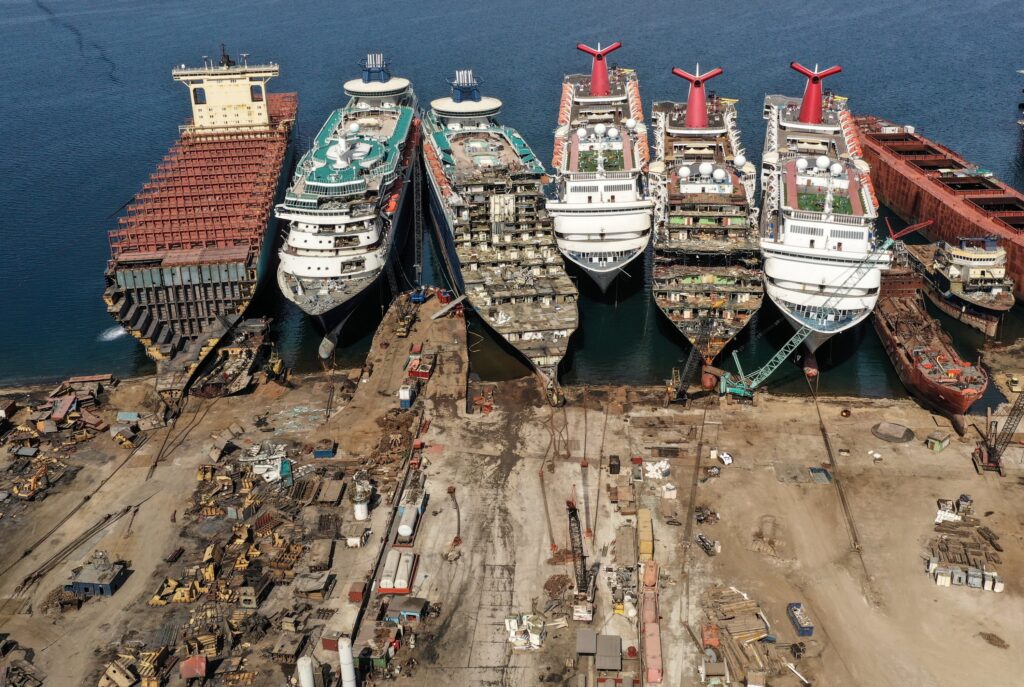Ship recycling, also known as ship breaking, is a crucial aspect of the maritime industry that involves dismantling and recycling old, retired, or decommissioned vessels. While ship recycling has been an integral part of the industry for centuries, the practices employed in the past have often raised environmental and social concerns. As we look toward the future, there is a growing need for sustainable ship recycling methods that prioritize safety, environmental protection, and social responsibility. In this article, we explore the potential avenues for a greener and more responsible future of ship recycling.
The Current Scenario:
Historically, many ship breaking yards, particularly in developing countries like Pakistan and Bangladesh, have been known for their hazardous working conditions and inadequate environmental safeguards. The pursuit of profits has, at times, come at the expense of worker safety and the surrounding ecosystem. Toxic materials, such as asbestos and heavy metals, found in older vessels pose a significant risk to human health and the environment when not handled properly. These concerns have led to calls for better regulations and improved ship recycling practices.
Regulatory Efforts:
Recognizing the pressing need for reform, several international conventions and regulations have been put in place to govern ship recycling. The Hong Kong International Convention for the Safe and Environmentally Sound Recycling of Ships, adopted in 2009, aims to address the environmental and social issues associated with shipbreaking. The convention requires the development of Ship Recycling Facilities (SRFs) that comply with stringent safety and environmental standards. However, for the convention to come into force, it requires a certain threshold of ratifying countries and recycling capacity, which remains a challenge. Out of South Asian ship recycling countries, Alang in India have grownup significantly and they have adopted HKC since long and most of their working yards are classified by classifications.
The Role of Technology:
Embracing technological advancements will play a crucial role in shaping the future of ship recycling. Automation and robotics have the potential to improve worker safety by reducing the need for human intervention in hazardous processes. Furthermore, technologies like 3D scanning and virtual reality can aid in the accurate assessment of the ship’s condition before it reaches the recycling stage, allowing for better planning and resource allocation. However, Alang ship recycling industries laid down many latest technologies for their work, and constantly they are improving.
Circular Economy and Sustainable Practices:
Transitioning towards a circular economy can revolutionize the ship recycling industry. Instead of viewing end-of-life vessels as waste, a circular approach considers them as a valuable source of materials. Recycling facilities can focus on extracting and reusing valuable resources like steel, aluminum, and other metals found in ships. This not only reduces the demand for virgin materials but also minimizes environmental impact and creates a sustainable supply chain.
Education and Training:
Gujarat Maritime Board (GMB) a nodal agency at Alang ship recycling yard, provides training for workers since 2003. Reason why Alang have done remarkable job in education and training of ship recycling. Many ship recyclers of Alang also providing scientific training for their worker inhouse. Promoting education and training initiatives within the shipbreaking industry can lead to substantial improvements. Properly trained workers are better equipped to handle ship recycling processes safely and efficiently. Additionally, fostering a culture of environmental responsibility and social awareness will encourage stakeholders to prioritize sustainable practices.
The Business Perspective:
Sustainable ship recycling can also be economically advantageous. As global awareness of environmental issues grows, consumers and investors are increasingly favoring companies that demonstrate commitment to sustainable practices. Shipowners and operators embracing green recycling methods may benefit from enhanced reputation and access to environmentally conscious markets.
Conclusion:
The future of ship recycling holds great promise, driven by the urgent need for sustainability and environmental protection. Implementing effective regulations, harnessing technology, adopting circular economy principles, and investing in education and training will be key to transforming the industry. Collaboration between governments, the maritime sector, and environmental organizations is crucial in creating a safer, greener, and socially responsible ship recycling ecosystem. By charting a course towards sustainability, we can ensure that the ship recycling industry becomes a beacon of environmental stewardship in the maritime world.
To get latest news, stories about ship recycling, please stay in touch with www.shippiginbox.com







